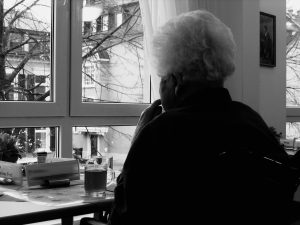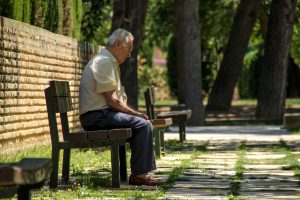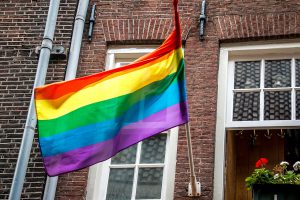June is Pride Month and we are 100% here for celebrating all the achievements of the past decades! But there are other things we can’t forget to look at amid all the positivity of this month. For example, young LGBT people still face bullying and mental health issues, and working-age individuals can still face discrimination in many states. It is important to highlight these issues, but there is a group that often gets forgotten in the discussion: LGBT seniors. As America’s aging population grows, so too does the number of LGBT seniors in the U.S.; in fact, in the next several decades, the number of LGBT older adults in this country is expected to double, with the number reaching 4 million by 2030. This group faces unique challenges as they age, and some experts are worried that they could be facing a health crisis. So what does the situation look like for LGBT seniors, and what can be done?
A Completely Different Experience of Healthcare
LGBT seniors are undoubtedly an underserved and underrepresented part of the population in our country, and they have lived through some very difficult times – and now it seems that many are suffering because of it. According to Karen Fredriksen-Goldsen, professor at the University of Washington’s School of Social Work, author of a study on aging and health in the older LGBT community, “The higher rates of aging and health disparities among lesbian, gay, bisexual, and transgender older adults is a major concern for public health. The health disparities reflect the historical and social context of their lives, and the serious adversity they have encountered can jeopardize their health and willingness to seek services in old age.”

One major issue is that older LGBT adults are often in a position to experience healthcare in a completely different way than the rest of the population does. For example, many people look to family to help care for them as they get older; in fact, in the U.S., 80% of long-term care for older adults is provided by family members, such as spouses, children, grandchildren, or other relatives. But LGBT seniors are only half as likely as heterosexual seniors to have close family to turn to.
That doesn’t mean that LGBT seniors don’t have any support network. Because many were shunned by their families when they were younger, or found it difficult to have children or adopt, they often created their own families. The problem with that healthcare-wise, though, is that it can be much more difficult for people of the same age to care for older adults, and in some situations, they might not even be legally able to.
For example, if you are not in a legally-recognized relationship, you won’t be granted medical leave to take care of a partner or other member of your chosen family, and you’ll be unable to help make medical decisions on their behalf. It can be unimaginable for someone who has never been in that situation, but it is the reality for many LGBT older adults.
All of this leaves many LGBT seniors to rely on outside sources for help, and that can come with its own set of problems. Doctors, pharmacists, and hospital or nursing home staff can be lifesavers for many seniors, but it is only natural that many LGBT seniors are wary of them, fearing that these medical professionals might be uncomfortable with or even hostile to them. Sadly, this is sometimes the case, which can be a huge problem for the health of LGBT seniors, but even the perception that they might be unwilling to help can be an issue. In fact, 21% of the seniors surveyed in the study mentioned above did not tell their doctors about their sexual orientation or gender identity out of fear of receiving inferior health care or being turned away for services. And this lack of openness “prevents discussions about sexual health, risk of breast or prostate cancer, hepatitis, HIV risk, hormone therapy or other risk factors,” according to Fredriksen-Goldsen.
The Problems of Financial Instability and Social Isolation
In addition to the sometimes negative experiences LGBT seniors have with healthcare in general, there are other factors that can make this community less healthy than other older adults. For one thing, it has become clear that LBGT seniors are more likely to be financially insecure than older heterosexual adults. For example, poverty rates among older lesbian and gay couples are 9.1% and 4.9%, respectively, compared with 4.6% among older heterosexual couples. Why is this community more likely to be living in poverty? There are multiple reasons, including discrimination experienced over their lifetime, and laws that have made it difficult for same-sex partners to get the same Medicare, Medicaid, Social Security, retirement, and inheritance benefits as heterosexual couples. Whatever the reason, financial instability can have serious effects on the health of LGBT seniors. And finances aren’t the only concern. As mentioned above, LGBT seniors are more likely to be socially isolated than other older adults: they are twice as likely to be single and to live alone, and three to four times as likely to be childless. And, unfortunately, they are also more likely to feel unwelcome in certain places, like senior centers and places of worship. Research shows that this increased social isolation leads to greater rates of depression, poor nutrition, delayed care-seeking, smoking, binge-drinking, and even premature mortality.
And finances aren’t the only concern. As mentioned above, LGBT seniors are more likely to be socially isolated than other older adults: they are twice as likely to be single and to live alone, and three to four times as likely to be childless. And, unfortunately, they are also more likely to feel unwelcome in certain places, like senior centers and places of worship. Research shows that this increased social isolation leads to greater rates of depression, poor nutrition, delayed care-seeking, smoking, binge-drinking, and even premature mortality.
These are all sobering facts and statistics, and might feel hopeless. But things are slowly changing, and there is hope, especially because many in the community we’re talking about have spent their lives working to change things.
Is Community the Answer?
So what can be done to change the landscape for LGBT seniors? Well, first there are the practical considerations: protections need to be put in place at the local, state, and federal levels so that LGBT seniors no longer face discrimination in employment and housing, and can enjoy all of the same benefits as married heterosexual couples.
But in addition to these very important legal protections, one thing that can make a big difference in the lives and health of LGBT seniors is community. According to a report issued by Services & Advocacy for GLBT Elders (SAGE), “access to support networks is one of the strongest predictors of better mental and physical health among LGBT older adults.” And there’s good news on this front. LGBT seniors are building their communities, and there is a growing number of ways they can find support and make connections.  For example, there are residential housing projects being built specifically for LGBT seniors, such as ones in Fort Greene, Brooklyn, Chicago, and San Francisco. There are organizations popping up in rural communities that bring older adults together through potluck dinners and discussion groups, and SAGE itself runs a national LGBT elder hotline. In some states, they even have a virtual drop-in center where a facilitator encourages callers to speak about LGBT issues in the state. Some nursing homes and care facilities are becoming more friendly to the LBGT community, but more training needs to be offered to staff so that all facilities can be welcoming and supportive to everyone.
For example, there are residential housing projects being built specifically for LGBT seniors, such as ones in Fort Greene, Brooklyn, Chicago, and San Francisco. There are organizations popping up in rural communities that bring older adults together through potluck dinners and discussion groups, and SAGE itself runs a national LGBT elder hotline. In some states, they even have a virtual drop-in center where a facilitator encourages callers to speak about LGBT issues in the state. Some nursing homes and care facilities are becoming more friendly to the LBGT community, but more training needs to be offered to staff so that all facilities can be welcoming and supportive to everyone.
So things are looking up, but there is definitely a lot more work to be done. LGBT seniors are strong, active participants in creating change, but it is vital that we all know the challenges that this community is facing, so we can also be advocates for their health and well being. According to Serena Worthington, Director of National Field Initiatives at SAGE, “This generation worked for civil rights and is now in a position where they need more protection. It’s unbelievably important that we pay attention.”